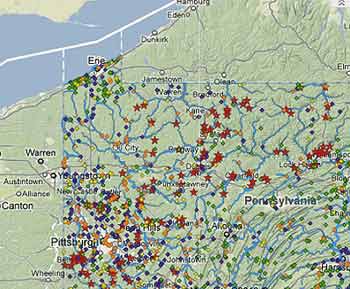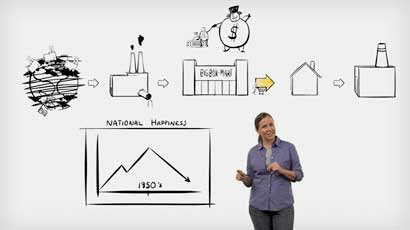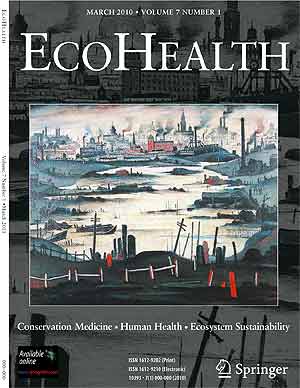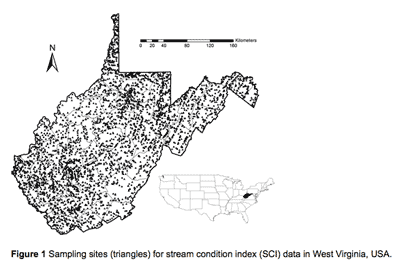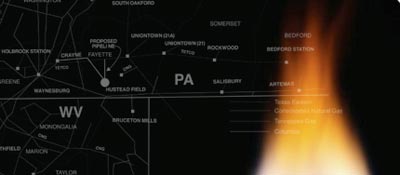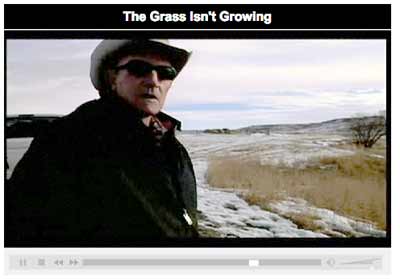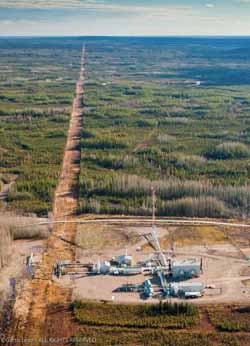Biblio
Created Sep 15, 2010 by Kyle Ferrar
This map shows the multitude of surface water withdrawals in Pennsylvania that are permitted by the PA DEP. The many points exemplify the magnitude that the PA community and economy relies on the quality of our surface water resources. The red stars show the oil and natural gas industry withdrawal locations.
Click to see more details on this map.
The current water management practices of the natural gas industry during the regional dry season are likely to have contributed to higher TDS concentration in the Monongahela River...
...the water withdrawals in the Monongahela River watershed are potentially causing a cumulative impact on flow volume in the river that magnifies all forms of pollution by increasing the pollutant concentrations. Much more research needs to be conducted on this issue, to ensure safe and sustainable permitting practices for water withdrawals.
See: Urbina, Ian. “Regulation Is Lax for Water From Gas Wells.” The New York Times 26 Feb. 2011. Web. 27 Feb. 2011.
See: With Natural Gas Drilling Boom, Pennsylvania Faces an Onslaught of Wastewater
See: WATER: Gas drilling in huge Appalachia reserve yields foul, briny byproduct - AP
In 2004, the Political Economy Research Institute ranked Dominion Resources 27th among corporations emitting airborne pollutants in the United States, the second highest rating behind Duke Energy.
Dominion has a web page citing its ecosystem conservation efforts and contributions. It earned $15 billion in 2009. Its main ecosystem project received funding of $500,000 in 2009.
Dominion operates the nation's largest natural gas storage facility with 975 billion cubic feet of storage capacity and serves retail energy customers in 12 states.
For this company's information resources on non-conventional production from coal bed methane and Marcellus shale gas, see the web page, Appalachian Gateway Project.
Includes Landowner's Rights, Source of Supplies, Project Schedule, Environmental Considerations.
It’s possible that there is $1 trillion worth of natural gas beneath the ground of Pennsylvania. With that kind of money at stake, out-of-state drilling companies are flocking to Pennsylvania and so are their lobbyists.
Use this site to find out which gas companies have been giving unlimited contributions to Pennsylvania politicians… and who's been taking them.
Common Cause Pennsylvania is a non-profit, non-partisan citizens' lobby organization. We are dedicated to restoring the core values of American democracy, reinventing an open, honest and accountable government that serves the public interest, and empowering ordinary people to make their voices heard in the political process.
We work to strengthen public participation and to ensure that the political process serves the public interest, rather than the special interest. Common Cause Pennsylvania conducted the data research available on this website as part of its "Deep Drilling, Deep Pockets" report, released in May of 2010.
Democracy Now! interview with Environmentalist, 350.org Founder Bill McKibben on Eaarth: Making a Life on a Tough New Planet.
Ahead of Bolivia’s indigenous summit on climate change and the expected unveiling of a Senate climate bill next week, we speak to someone who sounded one of the earliest alarms about global warming.
Twenty years ago, environmental activist Bill McKibben wrote The End of Nature, but his warnings went largely unheeded.
Now, as people are grappling with the unavoidable effects of climate change and confronting an earth that is suddenly melting, drying, acidifying, flooding and burning in unprecedented ways, Bill McKibben is out with Eaarth: Making a Life on a Tough New Planet, a new book about what we have to do to survive this brave new world. [includes rush transcript]
See:Global Warming Frequently Asked Questions
See also: Video - 350.org: Because the world needs to know.
What's the best way to introduce the world to 350?
With over 4000 languages spoken around the world, it's probably not with a bunch of words. We did our best to boil down the science of global warming and vision of the 350 Campaign in 90 seconds--and with no words.
Our focus is on the number 350—as in parts per million CO2. If we can't get below that, scientists say, the damage we're already seeing from global warming will continue and accelerate. But 350 is more than a number—it's a symbol of where we need to head as a planet.
Our theory of change is simple: if an international grassroots movement holds our leaders accountable to the latest climate science, we can start the global transformation we so desperately need.
This fragile Earth deserves a voice. It needs solutions. It needs change. It needs you.
Dirceted by Daniel Bird.
Music and sound design by Hecq.
See: The Story of Stuff | With Annie Leonard
Tides Foundation is proud to present The Story of Stuff — a 20-minute, fast-paced, fact-filled look at the underside of our production and consumption patterns that calls us together to create a more sustainable and just world.
Narrated and created by activist Annie Leonard, the film tells an engaging story about 'all our stuff' where it comes from and where it goes when we throw it away.
Tides Foundation and The Funders Workgroup for Sustainable Production and Consumption partnered with Free Range Studios to produce the film and the website, www.storyofstuff.com
The website includes faith-based teaching guides.
See: Beach Lake United Methodist Church. "Gas Drilling Discussion (Suggested Agenda for) : Biblical and Theological Considerations".
Earthjustice Fast Facts
Did you know? We've provided legal representation at no cost to more than 700 clients, from the Natural Resources Defense Council and the Wilderness Society to community-based coalitions. Here are some more facts about us:
- Founded in 1971 as the Sierra Club Legal Defense Fund
- Name changed to Earthjustice in 1997
- Headquartered in Oakland, CA
- Number of employees: ~150
- President: Trip Van Noppen
Shell | Appalachia
The acquisition of East Resources, a Pennsylvania-based oil and gas company, on July 29, 2010, is the foundation for Shell’s new operations and growth in the Appalachian Basin. Shell’s current Marcellus Shale operations are focused in Tioga County.
On May 28, 2010, Bloomberg.com reported that Royal Dutch Shell Plc agreed to buy closely held East Resources Inc., for about $5 billion.
East Resources will no longer be a U.S. corporation.
This will be the second-biggest oil and gas deal this year, after BP Plc’s cash acquisition of deepwater assets from Devon Energy Corp. for $7 billion on March 11, according to Bloomberg data.
Private-equity firm Kohlberg Kravis Roberts & Co. invested $350 million in East Resources 11 months ago, according to the Journal.
Exxon Mobil Corp., the biggest U.S. oil company, agreed in December to buy XTO Energy Inc., the country’s largest natural gas producer, for $31 billion to gain control of shale-gas assets. Companies from India’s Reliance Industries Ltd. to Japan’s Mitsui & Co. are spending billions of dollars on drilling to dislodge natural gas from shale -- sedimentary rock composed of mud, quartz and calcite.
East Resources, Inc. is an independent exploration and development company with more than 1.25 million acres of land holdings. East Resources owns and operates more than 2,500 producing oil and gas wells in New York, Pennsylvania, West Virginia, and Colorado and is actively exploring drilling programs in Wyoming.
On July 2, 2010, ProPublica reported wastewater from a nearby East Resources gas well leaked into a field and came in contact with farm animals resulting in a state-ordered quarantine of 16 cows.
See: A Fracking First in Pennsylvania: Cattle Quarantine
"Tests performed for East Resources Inc., found hazardous chemicals and heavy metals, including chloride, barium and strontium. East did not dispute that a leak had occurred."
Reuters reported that a survey by Pennsylvania Land Trust Association, based on data from state regulators found that East Resources committed the most violations, 138, followed by Chesapeake Appalachia LLC with 118, and the privately held Chief Oil & Gas Corp. with 109.
Dr. Nathaniel Hitt
Assessments of ecological integrity are commonly used for conservation planning, but are they also relevant for understanding public health and disease?
In this study, Hitt and Hendryx answer this question in the affirmative, demonstrating that the ecological integrity of stream benthic macroinvertebrate communities is related to human cancer mortality in West Virginia, USA.
The authors concluded that, although the macroinvertebrate data analyzed in their study were collected to assess the quality of aquatic life, such ecological assessments offer valuable insights for public health.
See: Ken Ward Jr. April 21, 2010. The Charleston Gazette | Coal Tattoo. "New WVU-Va Tech study links water quality and cancer deaths in West Virginia coalfields".
eCORP is a Houston, Texas, based multifaceted energy company which, through its subsidiaries, affiliates and related entities, is engaged in the development and operation of natural gas storage facilities, natural gas pipelines, electric power plants, and other energy related facilities.
eCORP and its principals and affiliates have been involved in Stagecoach Natural Gas Storage Facility, Tioga County New York.
The U.S. Department of Energy, Energy Information Administration reported in 2007 that the largest expansion of working gas capacity (13 Bcf) occurred at the Stagecoach natural gas storage site in New York State, a depleted-reservoir facility.
Wyoming rancher Ed Swartz is feeling the affects of environmental de-regulation. Hear his story.
Ed Swartz
Gillette, WY
Added: January 18, 2009
Co-Presenting Sponsor: The Fledgling Fund supports the creation and dissemination of innovative media projects that can play critical roles in igniting social change.
The Fledgling Fund believes that film and other creative media can often demonstrate what statistics can not, can create broad understandings of social problems, and can inspire both civic dialogue and concrete action.
Cornell Daily Sun Editorial. Published: 2/16/10.
Peter Meinig, chairman of the Cornell University Board of Trustees and former associate of a large natural gas company, is at the center of many competing interests, and should not participate in any decisions the University makes regarding leasing land for natural gas drilling.
...In order to reach the most appropriate outcome for Cornell, and for the University to remain above reproach and second-guessing by the many interested parties, Meinig should recuse himself from all decisions and discussions regarding the leasing of land for natural gas drilling.
Philadelphia Enquirer editorial. Published: Mar. 22, 2010.
...Representatives of the Marcellus Shale Coalition, an industry trade group, point out that not a single case of groundwater contamination has been linked to their drilling technique, called hydraulic fracturing or "fracking."
It involves pumping up to three million gallons of water (per well), combined with sand and chemicals, more than a mile underground to shatter the rock and release the gas.
But fracking does carry potential risks to the environment. Those concerns are causing government officials elsewhere to proceed cautiously on Marcellus drilling. New York state has imposed a moratorium on Marcellus wells until it completes an environmental-impact assessment.
Let us see if we have this right: The tap water is bubbling in Parker County, carbonated with enough natural gas to make it as flammable as a French Quarter cocktail and as explosive as a hand grenade, and the Texas Railroad Commission — consulting its Advent calendar, no doubt — has scheduled a hearing on the matter for Jan. 10.
No need to spoil the holidays with unpleasant decision-making; we’ll just let that gas keep percolating until next month, and hope we don’t get a big boom west of Fort Worth to ring in the new year.
If you haven’t been reading the recent accounts in the paper, here is what’s been going on in Parker County: Residents there reported that their tap water was bubbling. The federal Environmental Protection Agency did tests and determined that the water was contaminated enough by gas to create an imminent threat of fire or explosion. The EPA turned its results over to the railroad commission, which decided to hold a meeting...
See: Bluedaze. "Shale Survival Tools and Medical Information."
See: Sharon Wilson. Dec. 20, 2010. Earth Blog. "EPA's Xmas present to Texas families with drinking water polluted by drilling: cleaner water".
See: Argyle-Bartonville Communities Alliance. Dec. 14, 2010. "Keep Track and Speak Up."
Among the largest natural gas companies in North America, based in Calgary, Alberta.
The Michigan Land Use Institute reported that In 2006 the Colorado Oil and Gas Conservation Commission fined Encana $370,000 for flawed drilling practices. Residents said the drilling contaminated Divide Creek with methane and benzene.
Alan Boras, Encana’s spokesman, said in an interview that the leak was “a rare circumstance” caused by flaws in the cement that holds the well casing in place.
“Within less than a week of being alerted, the problem was rectified,” Mr. Boras said.
Lisa Bracken, on Journey of the Forsaken, reported on June 30, 2010 that,
"EnCana has recently submitted twenty well permits (with at least twenty more on the horizon) to infill drill in our neighborhood... despite 1) low natural gas prices, despite 2) EnCana suing the state of Colorado over new public safety rules (which are by the way utterly toothless) and which they say are driving them from Colorado; and, 3) despite the persistent, increasing and largely un-investigated presence of leaking hydrocarbon toxins into groundwater and private water wells.
Why the renewed surge in activity? Could be because China is dumping investment dollars into EnCana's bank account to facilitate extraction of gas for export to China?"
See: Natural gas: the commodity world’s ‘ugly duckling’.
See Lisa Bracken video.
See: Lisa Bracken Website: Journey of the Forsaken.
See: Will Koop. Encana's Cabin Not So Homey: Cumulative Environmental Effects - An Unfolding and Emerging Crisis in Northeastern British Columbis'a Shale Gas Plays. (PDF 13. 4 MB, 58 pp.). November 9, 2010.
An Introductory Journey Into BC's Dirty Domino Zone - Commentary and Recent Photos by Garth Lenz.
See: Letter written to Vancouver Sun by Fort Nelson First Nation Chief, Kathie Dickie. Dec. 22, 2009. (Koop, p. 21)
Calgary-based EnCana Corporation, Canada's largest gas producer, along with a consortium of seven other oil companies, is planning to build the biggest gas processing plant in North America in the heart of our 1910 treaty territory.
We've been told many things by the B. C government as we've tried to participate in the environmental assessment process. One official said that because our 100-year-old treaty doesn't specifically address clean air, we have no say on clean air when it comes to the construction of the biggest greenhouse gas creator in B.C. Imagine being told by a government official in 2009 that you have no say on the quality of air you or your children breathe! What parent would stand for it?
We understand the value to the province of shale gas development in the Horn River Basin. But such economic development, whether for our community or yours, should not come at the expense of a gutting of the land, water, and air where a community lives.
We are the only Treaty 8 Nation that lives within the Horn River Basin, and this gas plant, designed to open the basin to drilling, pipelines and gas development, will have an immense effect on our rights and interests. Without the capacity to determine and plan for this development, the survival of the Fort Nelson First Nation is in jeopardy. This plant and the development that it brings must not mean the end of us.
Source: Fort Nelson First Nation Chief, Kathie Dickie, Vancouver Sun, December 22, 2009, Premier’s climate-change hypocrisy could doom first nation’s way of life.
See: Julie Green. "The Game Changer." UpHere Business. June 2010.
...In mid-April, Dickie signed an agreement with Spectra. “It’s more than an impact-benefit agreement,” says Spectra’s Duane Rae. “It formalizes the relationship we already have and talks about how we’re going to continue working together.” The band is working on similar agreements with TransCanada and EnCana. Dickie has a list of substantial fears about shale development and water is at the top.
The sweet irony of this video - some things, like fracking, are best expressed with a cake!
A recent company event provided an opportunity for one of our engineers to educate children about natural gas development. Parents and educators often ask us for industry material to use with this audience so we made this video in the spirit of creativity.
What do 11 tubs of icing, more than two dozen cookies and 115 cupcakes have to do with natural gas? A lot, actually, once sculpted into a layer cake that uniquely demonstrates how the clean energy choice is extracted in our operations.
See: Encana | Mixplex.
See: Spectra Energy's "Kids Say [the] Darndest Things About Natural Gas".
Spectra Energy Watch said, "When gas companies send children to defend the industry, it is a sign of desperation."
Spectra Energy’s latest 3-minute PR effort in the form of a kiddie video includes a touch of irony. It begins with the kids comparing natural gas to farts, when asked, “What is natural gas?”.
The video has been removed by Spectra Energy. We saw it.







